According to Webster, the word “bespoke” means “Custom-made or dealing in or producing custom-made articles.” Speakers of the King’s English commonly use the term. However, it is rarely used by the former subjects of His Majesty on this side of the Big Pond. Unless we are talking about a beautiful custom-made pistol, like the Abernathy Bespoke 2011 from Tommy Guns.
Tommy Guns Abernathy Bespoke 2011 Race Gun
English gunmakers used bespoke to describe the exquisite double-barreled shotguns and rifles they were so famous for. These guns—one might call them pieces of art—were built from the ground up by skilled gunsmiths. This allowed them to meet the customer’s wants or needs exactly.
At one time, a majority of serious Action Pistol competitors used custom-built pistols produced by well-known gunsmiths. The tariff on these pistols was high, and the waiting time to get one tended to be lengthy. However, the popularity of Action Pistol shooting continues to increase. For this reason, a number of companies now offer pistols that have all the “bells & whistles” required by the serious competitor—off the shelf.
That’s right. You won’t have to wait many months for a pistol to be built. All you need to do is browse their websites and pick out the handgun you want. They’ll be happy to ship it to your FFL as soon as possible.
However, there is still something special about owning a pistol that was built exactly to your specifications. Or, as our friends in Merry Olde England would say, a “bespoke” pistol.
I have been competing in the Action Pistol sports for a pretty long time. And over the years, I have used a number of pistols that were customized just for this purpose. They all began life as off-the-shelf, factory pistols that were modified to make them more suitable for competition. In general, they served their purpose well.
Turning to Tommy Guns for a Custom Race Gun
In the past year, I have begun cleaning out my gun safes and selling off various firearms that I no longer need or desire. As a result, my gun safe had room for an envelope full of cash that I didn’t know what to do with. So, I discussed this “situation” with my wife, Becky.
She suggested, “Why don’t you use some of it to have Jeff build that match pistol you’re always talking about?”
Now, why didn’t I think of that?
Becky was speaking of my good friend Jeff Abernathy (below). He is one of the most respected 1911 smiths in this part of the country. Some of the most beautiful—and practical—custom 1911s I have ever seen have emanated from his shop. That shop is Tommy Guns USA, in Mount Holly, North Carolina.
I’ve reported on several of Jeff’s pistols in the pages of Combat Handguns, and this exposure has increased his business. To show his appreciation, he has been badgering me to let him build a pistol of my very own for the past two years.
Well, now you know where some of that “excess” cash went.
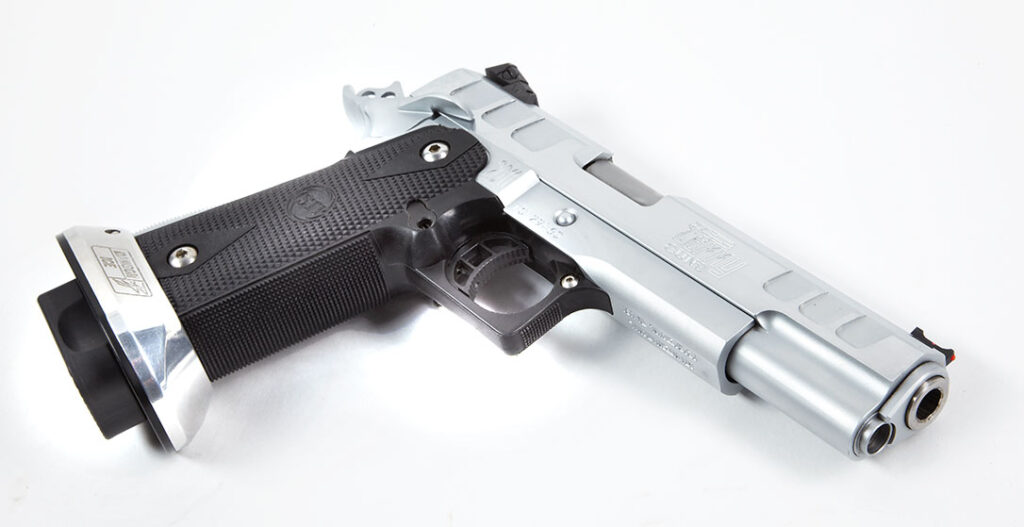
Why 9mm for my Custom 2011?
One of the first things Jeff asked me was what caliber I wanted, which led to a bit of a conflict. To make Major Power Factor in USPSA’s Limited Division, you must shoot a .40 caliber or larger pistol. So, after a bit of thought, I told Jeff, “Make it a 9mm.”
Before any of you start shaking your heads at this decision, let me explain my reasons for choosing this caliber:
- The 9mm is, and always has been, my favorite pistol cartridge.
- 9mm ammo and reloading components are more readily available and cheaper than .40s.
- It produces less recoil and has a higher magazine capacity. This means faster, more accurate shooting and fewer reloads.
- An A zone hit has the same points regardless of the caliber you are shooting, so you just have to shoot more carefully. Which is a good thing.
Since I now compete in USPSA matches for fun, not bragging rights, I have more fun shooting a 9mm pistol. In the past few years, I have noticed an increasing number of Limited shooters using 9mm pistols. When I queried them as to their choice, they all mentioned one or more of the above reasons.
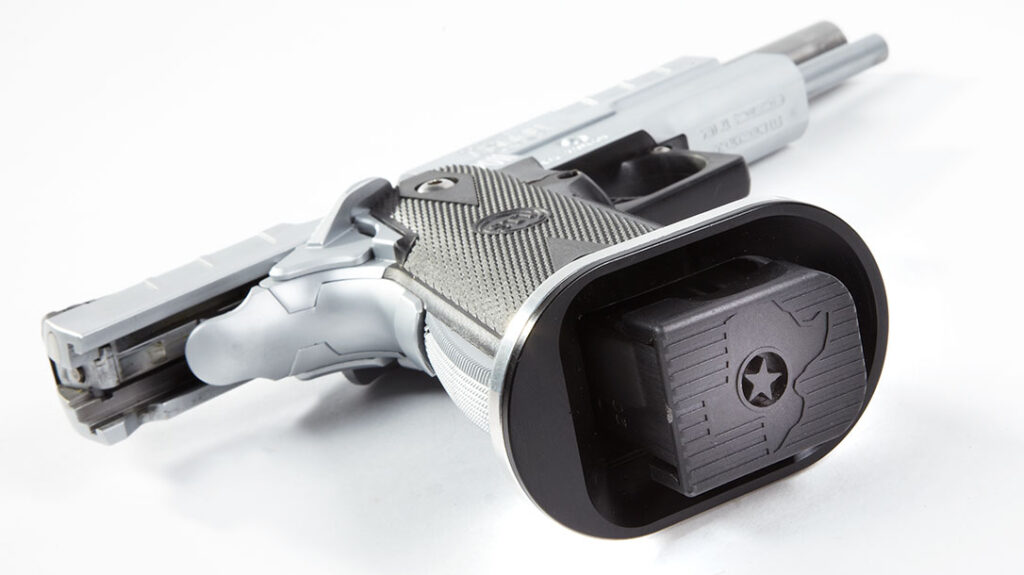
Picking a Direction for the Build
With the question of bore diameter settled, we discussed what features I wanted my 1911 to have. Likewise, we began making up a list of the necessary parts that Jeff would need.
Actually, the pistol Jeff built for me was not technically a 1911 because he used an STI 2011 high-capacity frame. It consists of upper and lower assemblies. The upper is made from 4140 alloy steel and contains the rails and dust cover. Correspondingly, the lower grip assembly is made from black, glass-filled nylon polymer with metal panels molded into it.
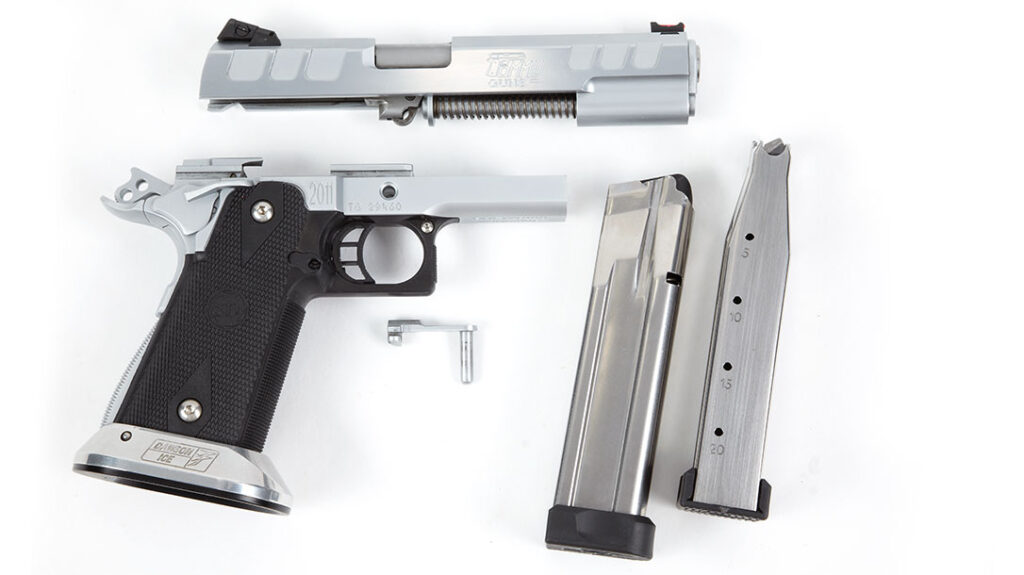
As a result, there is metal-to-metal contact with the upper frame. This allows a pistol to use double-column magazines while keeping the grip narrow enough for people with smaller hands.
Details of the Bespoke 2011
Before we go any further, I think it would be easiest to describe my pistol from top to bottom.
The stainless steel slide is also an STI product. Jeff machined dovetail cuts in it for mounting a Dawson fiber optic front sight and a low mount, fully adjustable Kensight rear sight. He then lowered and flared the ejection port to ensure that spent cases were removed reliably.
To make slide retraction positive, he machined a unique set of front and rear grasping grooves. He refers to these as large panel-cut cocking serrations. These provide a much more secure purchase than regular cocking serrations. Not to mention, their appearance really sets this pistol apart from the crowd.
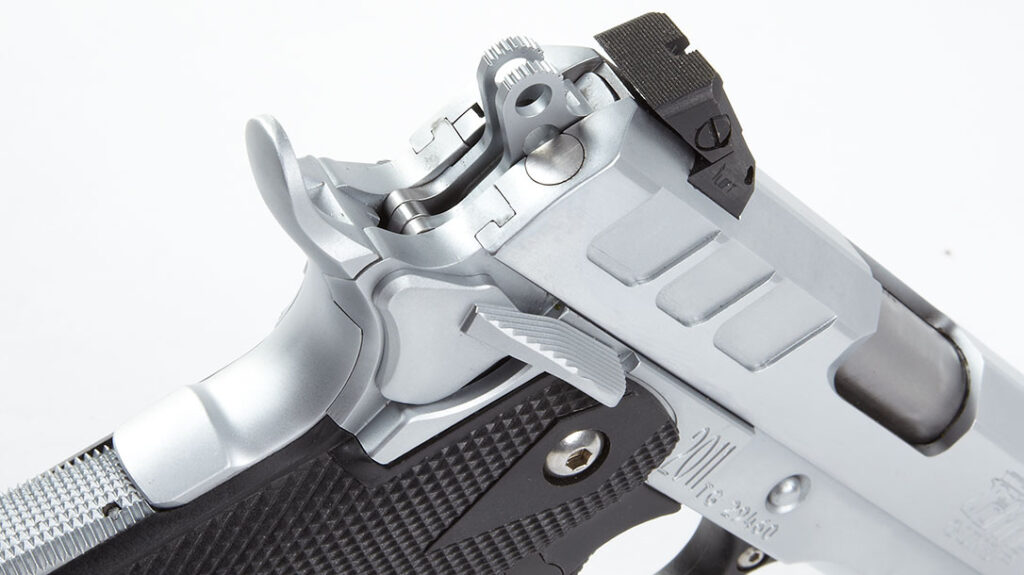
Inside the slide, he hand-fitted a KKM match-grade five-inch barrel positioned by an EGW stainless barrel bushing. In addition, it has an Aftec competition extractor, EGW firing pin stop, and Dawson Hyper Drive extended firing pin. A Wolff 8-pound recoil spring around an EGW full-length recoil spring guide rod ensures reliable and smooth slide reciprocation.
As we move down to the aforementioned STI 2011 frame, we find several more EGW components. These include a slide stop lever (not extended!), extended, ambidextrous thumb safeties, EGW/Koenig Ultimate trigger kit (low mass trigger and hammer, sear and disconnector).
At the rear of the grip frame is a Dawson extended grip safety with palm swell and arched mainspring housing. Jeff fitted the bottom of the grip frame with a Dawson ICE magwell and included an extended magazine release. As a result, this ensures fast, fumble-free reloads.
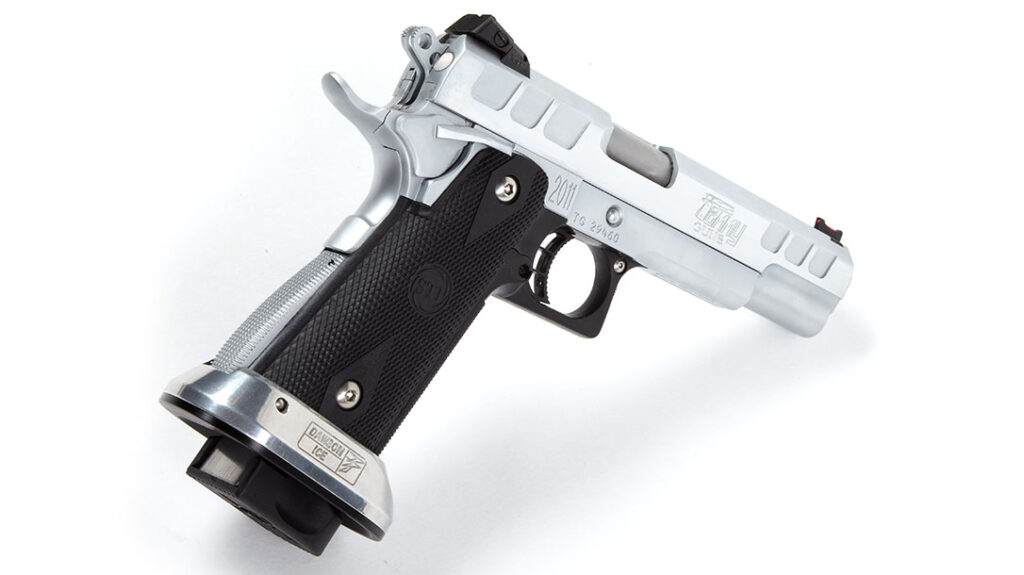
Lastly, I ordered several STI twenty-round magazines so that I would have sufficient cartridge containers.
The Finished Product
A few months later, I received a call from Jeff informing me that he had finished my pistol. So, I quickly beat feet down to his shop. While there, I loaded four 20-round magazines with eight different 9mm brands and fired into the backstop behind his shop.
During this I experienced the only malfunction I have experienced so far. One round of a rather long 147 gr. match load hung up on the feed ramp.
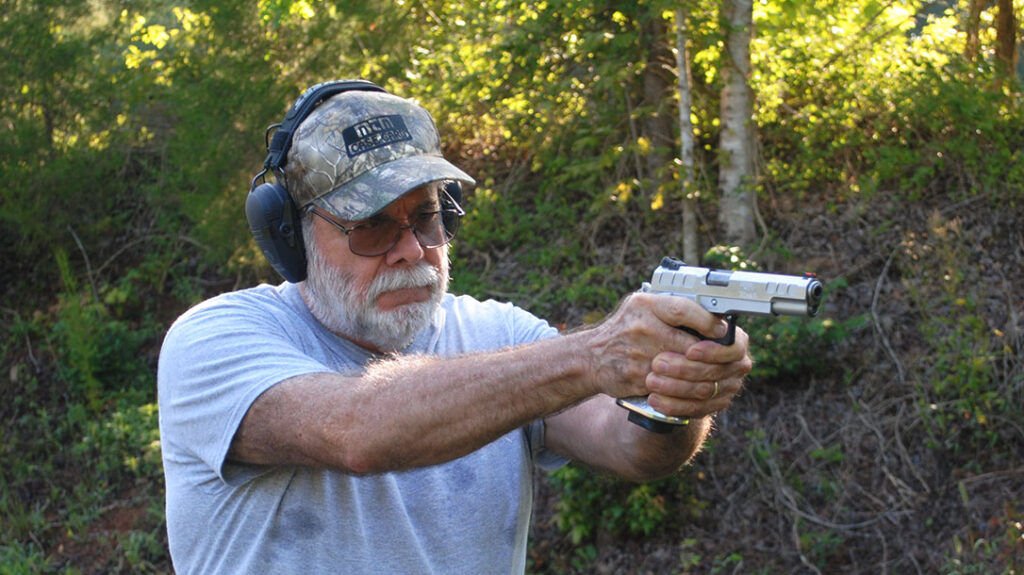
Jeff took the pistol back into the shop and polished the chamber and feed ramp a bit. After running through two more magazines of the offending ammo, I didn’t experience a bobble or burp. I just stood there with a big smile on my face.
Jeff said, “I guess I don’t have to ask you if you like it. Do I?”
No, he didn’t.
Shooting the 2011 Race Gun
A few weeks later, on a hot, humid July morning, my wife and I headed out to our gun club. Using an MTM K-Zone pistol rest, I zeroed my pistol in at 15 yards with four types of 9mm ammunition. I selected ammo commonly used in Action Pistol matches.
After a few clicks of the rear sight’s adjustment screws, I was printing groups in the sub-two-inch range. This is about as good as this boy can shoot. As with many 9mm pistols that I have tested, accuracy improved as bullet velocity shrunk.
Honors went to Speer’s new 150 gr. Syntech match load. It put five rounds into a group measuring close enough to one inch to make no difference.
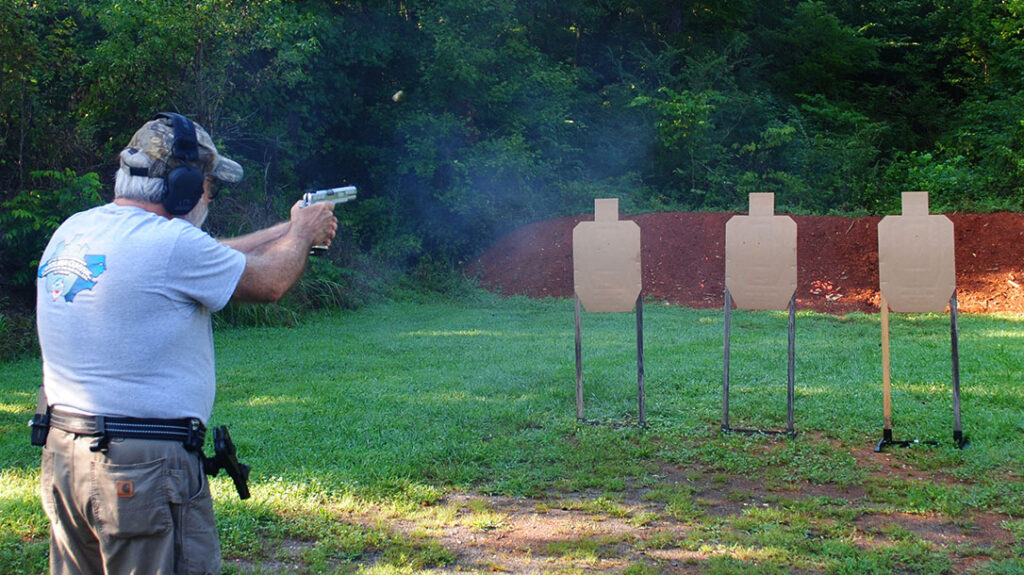
Then, using a C-R Speed M2000 holster, I ran my pistol through one of my favorite drills—the El Presidente. I began facing up range and, on a signal, turned, drew the pistol, and double-tapped three targets. Then, I performed a combat reload and double-tapped them again.
I ran the drill three times and walked up to examine the targets. All eighteen rounds formed well-centered clusters in the targets’ A zones. A number of them had oval-shaped perforations, indicating I put two bullets in the same hole.
Does Jeff build fine-handling, accurate pistols? Damn right!
Seeing no sense in hauling a lot of ammo home, we then removed ourselves to the club’s steel range. We then spent an enjoyable half hour engaging steel plate racks. Firing the pistol in a shaded area with high humidity created large clouds of vapor. One bystander even told us it looked like we were firing black powder!
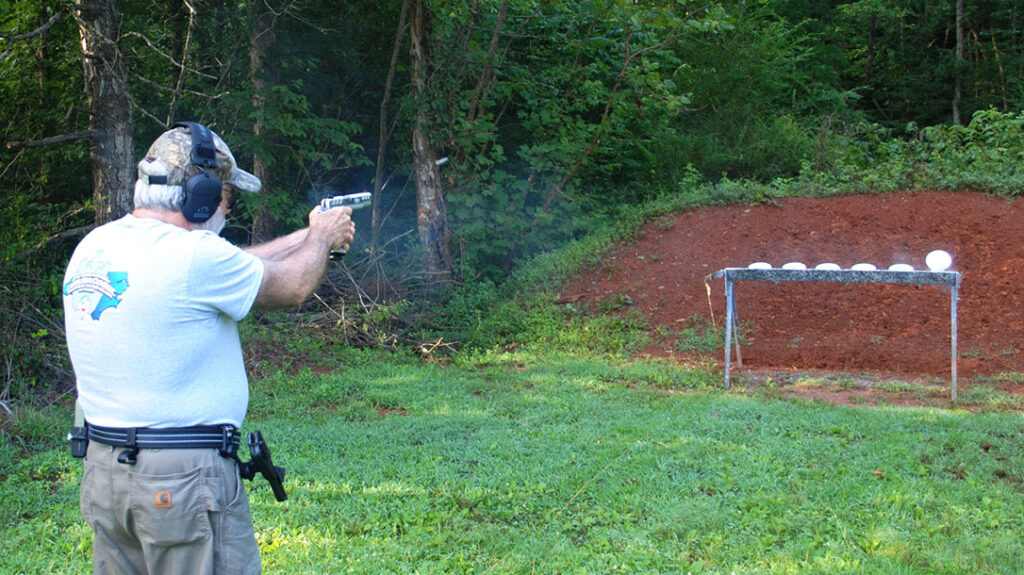
The Competition Handgun I’ve Always Wanted
My Tommy Guns USA bespoke 2011 is everything I’ve always wanted in a competition handgun. I can’t wait to run it through its paces at upcoming USPSA matches.
Having such a fine-looking pistol will not guarantee that I will win these matches. However, wearing and shooting a pistol that impresses (awes?) your fellow competitors can do wonders for your ego.
For more information, please visit TommyGunsUSA.com.
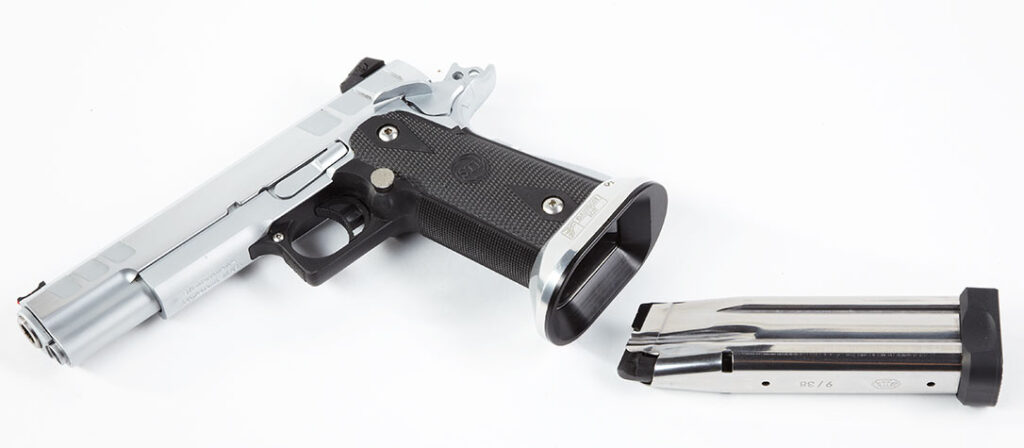
Tommy Guns Abernathy Bespoke 2011 Race Gun Specs
| Caliber | 9mm Parabellum |
| Overall length | 8.75 inches |
| Barrel length | 5 inches |
| Weight (unloaded) | 43 ounces |
| Front Sights | Dawson fiber optic |
| Rear Sights | Kensight fully adj. |
| Magazine | 20 rounds |
| Construction | stainless steel |
| Finish | hard chrome |
| Grips | Polymer |
| Trigger pull | 2.5 pounds |
| MSRP | $3700.00 |
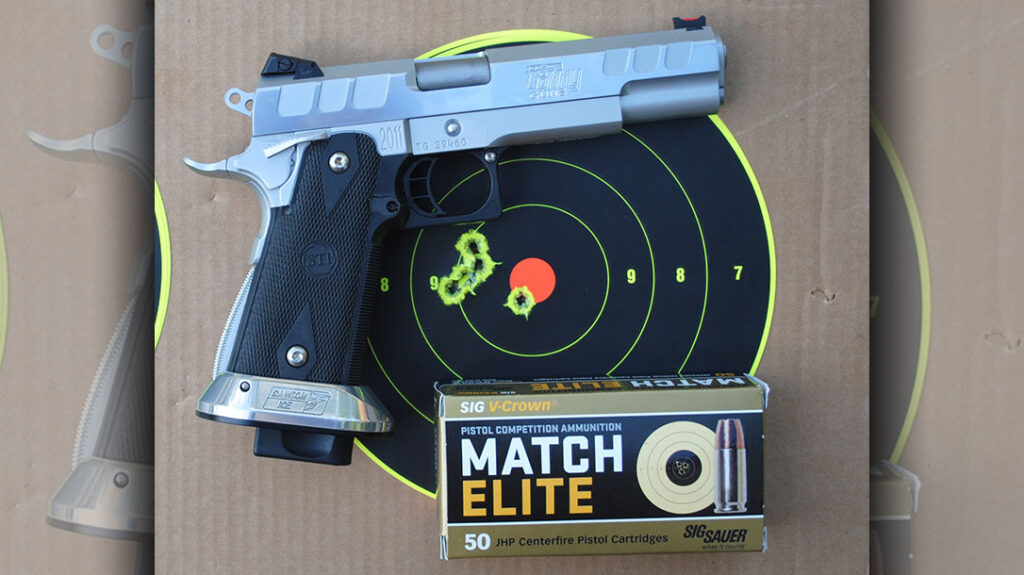
Performance
| Ammunition | Group Size (in.) | Velocity (fps) |
| SIG-Sauer 147 gr. Match Elite | 1.3 | 883 |
| Cor-Bon 147 gr. Performance Match | 1.5 | 942 |
| Winchester 147 gr. Win3Gun | 1.4 | 937 |
| Federal 150 gr. Syntech | 1.0 | 859 |
NOTE: group size is the smallest of three, five shot groups fired from an MTM K-Zone rest at 15 yards. Velocity is the average of five rounds chronographed 10 feet from the muzzle.
Master Gunsmith Jeff Abernathy
Jeff Abernathy is the founder and CEO of Tommy Guns USA. He is carrying on the legacy of his late father, Tommy Abernathy, who was a Master tool and die maker. Likewise, he built custom guns for thirty years, specializing in the 1911 platform.
Jeff is a trained machinist and apprenticed with his father for ten years. During that time he learned how to build custom pistols, as he put it, “…from the best.”
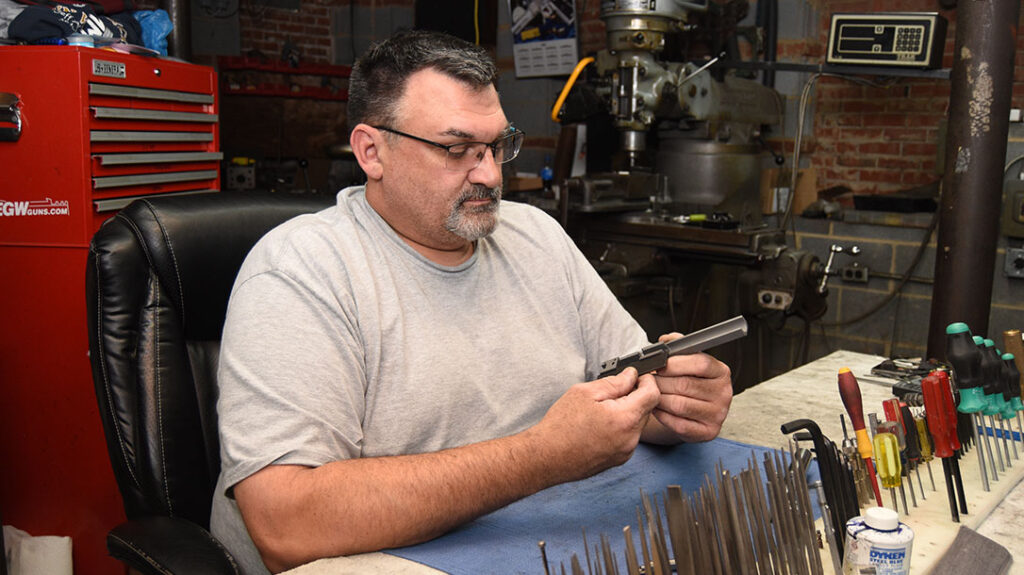
He still works in his father’s original shop where he learned so much. For this reason, all of his pistols are still engraved with the “Tommy Guns” logo in memory of his father.
When the Para-Ordnance Company moved from Canada to Charlotte, North Carolina, Jeff was hired as the head of their custom shop. After Para closed, Jeff returned to working as a machinist. However, his dream was always to work for himself, full-time, building guns. After surviving a four year battle with prostate cancer he decided it was time.
In July 2017, Jeff opened Tommy Guns USA and now works full-time repairing and building custom guns. Like his father, he specializes in 1911 pistols and has built guns for professional shooters and grand masters all over the United States. Several of these have been featured in past issues of Combat Handguns.
Jeff is married to Melanie, who is also an entrepreneur. They enjoy being able to spend time together while both working from their home in Mount Holly, North Carolina. They also enjoy traveling and frequently visit Annapolis, Maryland where their son is a Junior at the United States Naval Academy.
Jeff looks forward to working with you on the custom gun of your dreams. Remember that nothing runs like a Tommy Gun.



Didn’t find what you were looking for?
Read the full article here
